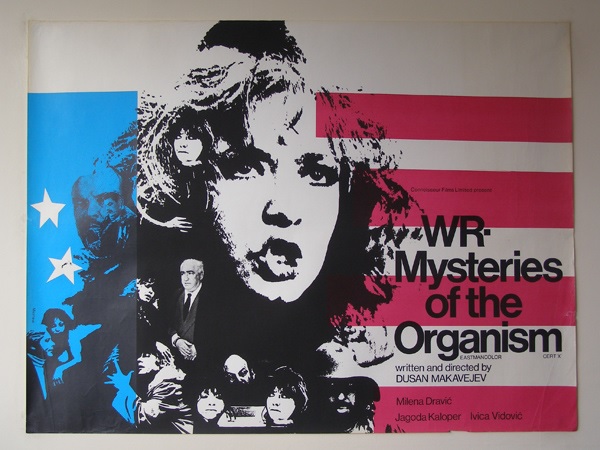Yugoslavian director Dušan Makavejev was always an unconventional artist, making movies that challenged his audience, and often showed the unglamorous sides of society, trying to depict true life. He often did this in incredibly filthy ways, and many of his movies were banned for decades. Typically they are loved by snobby critics, despite containing everything they hate about 'lowbrow' films. His 1971 effort W.R.: Mysteries of the Organism was considered so transgressive for a number of reasons that the Yugoslavian government banned the film and exiled its director.
Milena is an ardent communist, preaching her radical ideas of sex to everyone around her. One day sees the arrival of a champion ice skater from the Soviet Union, and she is instantly fascinated, and becomes determined to bring him to her way of thinking...
W.R.: Mysteries of the Organism is a collage of many disparate elements, all working together for the one common goal-The importance of sex and fighting repression. The main subject is fascinating and discredited psychoanalyst Wilhelm Reich. A student of Freud, a staunch anti-fascist, and by all accounts a talented doctor until he went a little of the deep end in his later years, some might say. He believed sex was a vital force of the universe, and became convinced of the existence of Orgone, an orgasmic universal energy.
Reich set up a colony in a rural American town, and was an eccentric figure, liked by some, but distrusted by others. Some thought he was a depraved pervert, others thought he was a communist, and this all ignited when there were attacks by a mob, and an FBI raid, leading to Reich's arrest and the seizure and destruction of all his works. It's a gripping story, and really makes you think! On one hand Reich's theories sound laughable and insane, like a typical crackpot. But on the other hand, the severity in which the government cracked down on him was unheard of, and unacceptable. To bust all of his property, burn his books, and arrest him, just because he was a crackpot is antithetical to what America stands for. He may have loony, but who knows. Bread mold did turn out to be medicine after all. It is also telling of the government's priorities when they do nothing about the rampant snake oil sold in the country, but destroyed Reich's work. My opinion is that not that there was a shadowy conspiracy determined to hide the 'truth of universal harmony through orgasms', but rather they were just keen to clamp down on sexual freedom and expression, which is a big theme of this film. God knows they weren't doing it because they had anyone's best interests at heart.
This works well as a documentary, though it never has a total conclusion of his story, and a few details of Reich's life that would've been interesting to hear never come up. There are positives and negatives that could've painted a bigger picture. I only know about them due to my own research.
This documentary takes up about a third of the film, while the rest presents a fictional tale of Yugoslavian politics, seen through a comedic lens, with a few shocking twists. The story of Milena has a flippant tone, and many amusing moments, namely her big speech to the masses. The ending is also bizarre, and provides the film with one of its most lasting images.
The remainder of the film is all over the place, showing various events and people in present day America, from interviews with doctors, pornographers, and artists, to scenes of singer and beatnik Tuli Kupferberg running around New York dressed as a crazy soldier. These were definitely my least favourite sections. That whole hippy/art/sex scene just really irks me, in a lot of ways. I roll my eyes at all of them.
Mysteries of the Organism definitely has a unique structure, and is like little else. It's an experimental affair, but one that is also still watchable. Though I did feel the structure was too random at times, flitting between as many as three stories in 1 minute, often showing something so brief or tangential that it felt pointless, [and didn't add anything].
Now, the big question is-Did I actually like this movie? I may have found it interesting, but is it enjoyable, or a good movie to me? My reaction is somewhere in the middle. I enjoyed it, and it is a good movie, though it's definitely not for everyone. Some might be put off by its structure, or its frank sexuality (and I for one could've done without seeing hairy 1970s dudes naked!), and I personally feel the movie is flawed. There are whole scenes or sections I thought could have been easily excised, and my personal preference would've been if the film had've just been half documentary on Reich, half the story of Milena,
Milena's roommate is amusing, as well as nice on the eyes, parading around buck naked in every scene, with what appears to be a crotch rug. She's often having sex, embodying Milena's values physically while she espouses them through words. Soviet ice skater Vladimir Ilyich is a bit of a stuck up knob, which Milena intends to change. He speaks positively of Yugoslavia and its decision to forge its own path away from the Soviet Union, though in a very paternalistic way. 'We respect you. Which is why we know you'll eventually agree that our way is best.' Speak for yourself, Russkie!
As a documentary, the number of actors per se in this movie is fairly low. The interview subjects range from interesting, to quirky, to annoying. The rarity of interviews with some of these people really makes this a somewhat important resource. The actual actors are all in the Milena story, and is comprised of some Yugoslav regulars, namely Milena Dravić. She is spunky and has a great sense of humour, and its telling of her acting skills that in a movie like this she never needs to get her kit off in order to be memorable.
Musically there is a lot to intrigue here. There are traditional Yugoslavian melodies, communist songs, hymns, and even experimental choices with a couple of songs by hippy protest band The Fugs. Some of them are nice, or at least culturally interesting to listen to, while others are annoying. I confess to not being a fan of The Fugs or Kupferberg's singing voice at all (although admittedly the lyrics to Kill for Peace got a chuckle out of me).
W.R.: Mysteries of the Organism has built up quite a cult following over the years, even getting a spiffed up Criterion release. It's a great treat for those interested in anarchic cinema, sexual taboos, or eccentric figures...










No comments:
Post a Comment